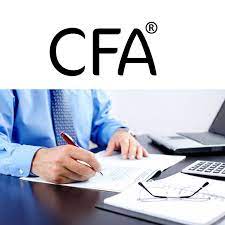How Hard Is a CFA? Difficulty Level, Exam Breakdown & What to Expect
How Hard Is a CFA? Difficulty Level, Exam Breakdown & What to Expect

Accounting
The Chartered Financial Analyst (CFA) credential is widely regarded as one of the most prestigious and challenging certifications in the finance industry. Often pursued by investment professionals, portfolio managers, and analysts, the CFA program is known for its rigorous curriculum, demanding exams, and low pass rates. But just how hard is the CFA? In this article, we’ll explore the difficulty level of the CFA exams, the skills and dedication required to succeed, the time commitment involved, and what it really takes to earn this coveted title.
Whether you’re considering enrolling in the CFA program or simply curious about what makes it so intense, this comprehensive guide breaks down the CFA challenge from all angles—exam structure, study hours, mental pressure, and real-world expectations.
What Is the CFA Program?
The CFA (Chartered Financial Analyst) program is a globally recognized certification administered by the CFA Institute. It is designed to measure and certify the competence and integrity of financial analysts. The program comprises three levels of examinations that focus on investment management, financial analysis, ethics, and professional standards.
Candidates who successfully pass all three levels and meet professional experience requirements earn the CFA charter, a credential that is respected in over 160 countries. It is particularly valuable for those pursuing careers in investment banking, equity research, asset management, and corporate finance.
Explore more: What Is CFA?
Why Is the CFA Considered Difficult?
The CFA program is widely regarded as one of the most difficult professional certifications in finance. Its difficulty stems from several core factors:
Vast Curriculum
Each level of the CFA exam covers a significant volume of material. Topics range from ethical and professional standards to quantitative methods, economics, financial reporting, equity investments, derivatives, and portfolio management. Candidates are expected to grasp not only foundational knowledge but also its application in complex real-world scenarios.
Low Pass Rates
Historically, CFA exams have low pass rates, especially at Level I and Level II. According to CFA Institute statistics:
-
Level I pass rate (2023): ~37%
-
Level II pass rate (2023): ~44%
-
Level III pass rate (2023): ~48%
This means that fewer than half of candidates make it through each level, and even fewer pass all three on their first attempt.
Time Commitment
The CFA Institute recommends at least 300 hours of study per level. This means a candidate might spend around 900+ hours of study time across all three levels. Most candidates spend 6–9 months preparing for each level.
Difficulty of Exam Questions
The exam questions are not only conceptually deep but also complex in structure. Level I focuses on knowledge and comprehension. Level II demands application and analysis, while Level III requires synthesis and evaluation, especially in portfolio management and essay-format questions.
Exam Format and Pressure
-
Level I: 180 multiple-choice questions (divided into two 2.25-hour sessions)
-
Level II: 88 item-set questions (case studies)
-
Level III: Constructed response (essay questions) and item sets
The structure and timing increase the pressure, especially for working professionals managing full-time jobs.
Read more: CFA vs MBA – Which Should You Choose?
Breaking Down Each CFA Exam Level
Let’s explore what makes each level of the CFA exam progressively harder:
Level I: The Foundation
Focuses on investment tools, ethical standards, and a basic understanding of asset valuation and portfolio management. Level I is often described as “broad but shallow.” Candidates must answer 180 multiple-choice questions covering ten topic areas.
Biggest Challenge: Memorizing large volumes of foundational content and understanding core concepts from multiple disciplines.
Level II: The Analyst’s Test
Level II emphasizes asset valuation, financial reporting, and investment tools, but in a much more applied context. Questions are formatted as item sets (mini case studies), requiring candidates to synthesize information and apply it to solve complex financial problems.
Biggest Challenge: Transitioning from memorization to analytical thinking under timed conditions.
Level III: The Portfolio Manager’s Exam
Level III shifts focus to portfolio management and wealth planning. It includes constructed response (essay) questions, which test the ability to articulate strategies, synthesize complex concepts, and provide reasoned investment advice.
Biggest Challenge: Mastering written communication under pressure and integrating knowledge from all prior levels.
Explore more: CFA vs CPA – Which Path Is Right for You?
What Skills Do You Need to Succeed in the CFA Program?
To succeed in the CFA program, you need more than just financial knowledge. Here are the key skills that can help you navigate the challenge:
Analytical Thinking
The ability to analyze financial data, evaluate investment opportunities, and interpret market trends is essential. Level II and III particularly demand a deep analytical mindset.
Time Management
Balancing study with work and personal commitments is one of the biggest hurdles. Effective time management, discipline, and long-term commitment are non-negotiable.
Written Communication
Especially for Level III, you need to clearly explain your thought process, strategy, and conclusions. Practicing essay responses is critical.
Ethical Decision-Making
Ethics is one of the most heavily weighted areas at every level. A strong grasp of professional standards is crucial to passing and succeeding in real-world finance roles.
Stress Tolerance & Discipline
The CFA journey is long, often taking 3–4 years to complete. Staying motivated and consistent, especially after failures, requires mental toughness and resilience.
Who Should Consider the CFA—and Is It Worth It?
The CFA is best suited for professionals aiming for careers in:
-
Investment banking
-
Portfolio and asset management
-
Equity research
-
Corporate finance and FP&A
-
Wealth management
Despite its difficulty, the CFA charter is often seen as a gateway to career advancement, higher earning potential, and recognition as an investment expert. However, it’s not ideal for everyone—those interested in general management or entrepreneurship may benefit more from an MBA.
Read more: What Can You Do With a CFA?
Tips for Navigating the CFA Journey
Start Early
Begin your study plan at least six months before the exam. Use a combination of CFA Institute materials and third-party study platforms.
Stick to a Schedule
Create a study plan with daily and weekly goals. Make sure to include time for mock exams and review periods.
Focus on Weak Areas
Use diagnostic tools to identify weak areas and spend extra time mastering them.
Practice with Real Exam Questions
Take as many mock exams as possible under timed conditions. Familiarity with the exam structure reduces anxiety and increases speed.
Join Study Groups or Forums
Engaging with a community can keep you motivated and help clarify difficult topics.
Take Care of Yourself
Avoid burnout by balancing study with exercise, sleep, and healthy routines. Long-term performance relies on physical and mental well-being.
The CFA vs Other Certifications
How does the CFA compare to other professional finance certifications?
Explore more: CFA vs CMA – Which One Should You Choose?
How Long Does It Take to Complete the CFA?
Most CFA candidates take an average of 4 years to complete all three levels. Here’s a breakdown:
-
Level I: Typically takes 6 months of preparation
-
Level II: Considered the most challenging; requires 6–9 months
-
Level III: Demands the ability to write structured, reasoned responses; 6–8 months is common
This timeline can extend if a candidate needs to retake one or more levels.
The Future of the CFA Charterholder
The demand for CFA charterholders remains strong, especially in asset management, fintech, ESG investing, and global banking. However, the role is evolving:
-
Fintech: CFA charterholders are increasingly expected to understand data analytics and emerging technologies.
-
ESG Investing: Ethical and sustainable investing are gaining importance in CFA curricula and real-world roles.
-
Globalization: Cross-border investing and international finance demand a global perspective, which the CFA curriculum provides.
The CFA designation is one of the most respected and rigorous achievements in the finance world—but it is not for the faint of heart. With a low pass rate, a comprehensive and complex curriculum, and a high time commitment, the program demands unwavering discipline, focus, and resilience.
If you're determined, analytical, and committed to a career in finance, the CFA can open doors to exciting roles and significant career growth. The journey is tough, but for those who succeed, the rewards are well worth the effort.
Related Articles
Explore Articles on Finance, Accounting, and Career Growth


